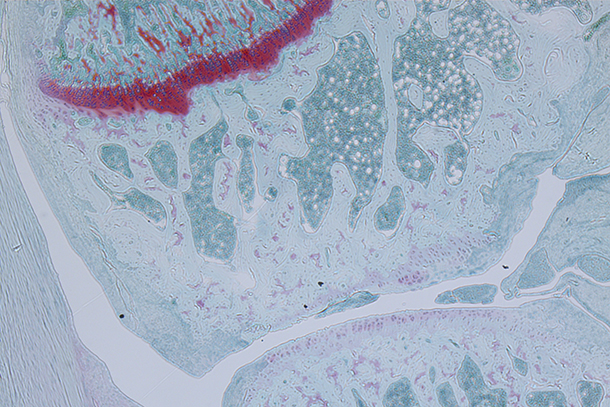Will there come a time when a patient with arthritis can forgo joint replacement surgery in favor of a shot? Denis Evseenko, MD, PhD, associate professor of orthopaedic surgery at the Keck School of Medicine of USC, has reason to be optimistic.
In a new publication in the Annals of the Rheumatic Diseases, Evseenko’s team — led by PhD student Ruzanna Shkhyan, postdoctoral scholar – research associate Ben Van Handel, PhD, and medical student Jacob Bogdanov — describes the promise of a new molecule aptly named “Regulator of Cartilage Growth and Differentiation,” or RCGD 423 for short.
Discovered by the Evseenko team, RCGD 423 enhances regeneration while curbing inflammation. When the scientists applied RCGD 423 to joint cartilage cells in the laboratory, these cells proliferated more and died less. When the scientists injected RCGD 423 into the knees of rats with damaged cartilage, the animals could more effectively heal their injuries.
RCGD 423 exerts its effects by communicating with a specific molecule in the body. This molecule, called the gp130 receptor, receives two very different types of signals: those that promote cartilage development in the embryo, and those that trigger chronic inflammation in the adult. RCGD 423 amplifies the gp130 receptor’s ability to receive the developmental signals that can stimulate cartilage regeneration, while blocking the inflammatory signals that can lead to cartilage degeneration over the long term.
Given these auspicious early results, the team is already laying the groundwork for a clinical trial to test RCGD 423 or a similar molecule as a treatment for osteoarthritis or juvenile arthritis.
“The goal is to make an injectable therapy for an early to moderate level of arthritis,” said Evseenko, a USC Stem Cell scientist. “It’s not going to cure arthritis, but it will delay the progression of arthritis to the damaging stages when patients need joint replacements, which account for a million surgeries a year in the U.S.”
Evseenko sees RCGD 423 as a prototype for a new class of anti-inflammatory drugs with a very broad range of indications. The lab already has developed several structural analogs of RCGD 423 with varying biological effects and potency. His lab is partnering with scientists at USC and beyond to explore the broader potential of these molecules to treat rheumatoid arthritis, jaw arthritis, lupus, neurological and heart diseases and baldness, as well as to maintain pluripotent stem cells in the laboratory.
Co-authors of the arthritis study include: Siyoung Lee, Mila Scheinberg, Nicholas W. Banks, Sean Limfat, Arthur Chernostrik, Carlos Eduardo Franciozi, Ling Wu, Gabriel B. Ferguson, C. Thomas Vangsness Jr., and Nancy Q. Liu from USC; Yifan Yu from USC and Nanjing Medical University in China; Mohammed Parvez Alam, Varghese John, Ali Nsair, Frank A. Petrigliano, Kanagasabai Vadivel, and Paul Bajaj from UCLA; and Liming Wang from Nanjing Medical University.
Fifty-three percent of the research was supported by $1.35 million of federal funding from the National Institutes of Health (K01AR061415) and the Department of Defense (W81XWH-13-1-0465), and 47 percent was funded by $1.2 million of state funding from the California Institute for Regenerative Medicine (RB5-07230).
— Cristy Lytal


